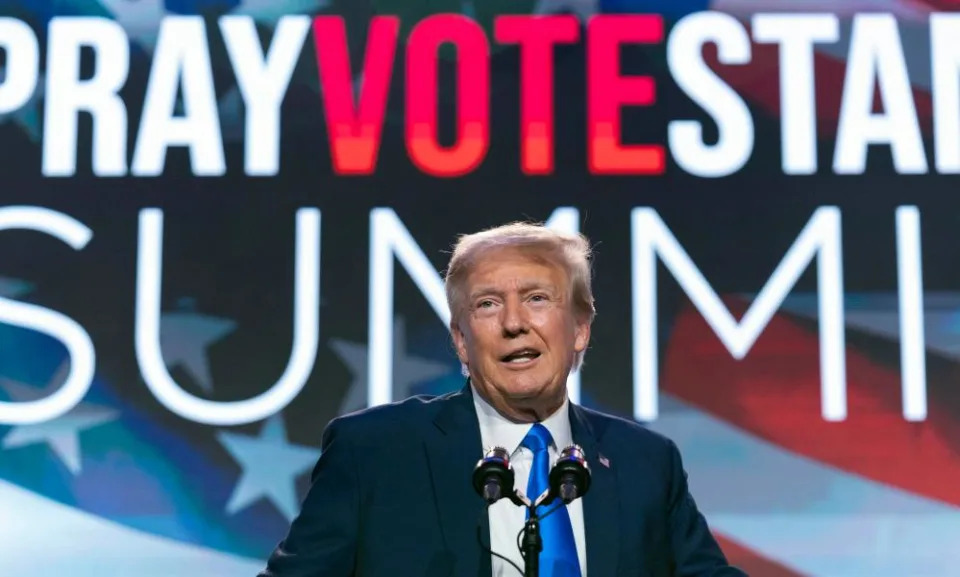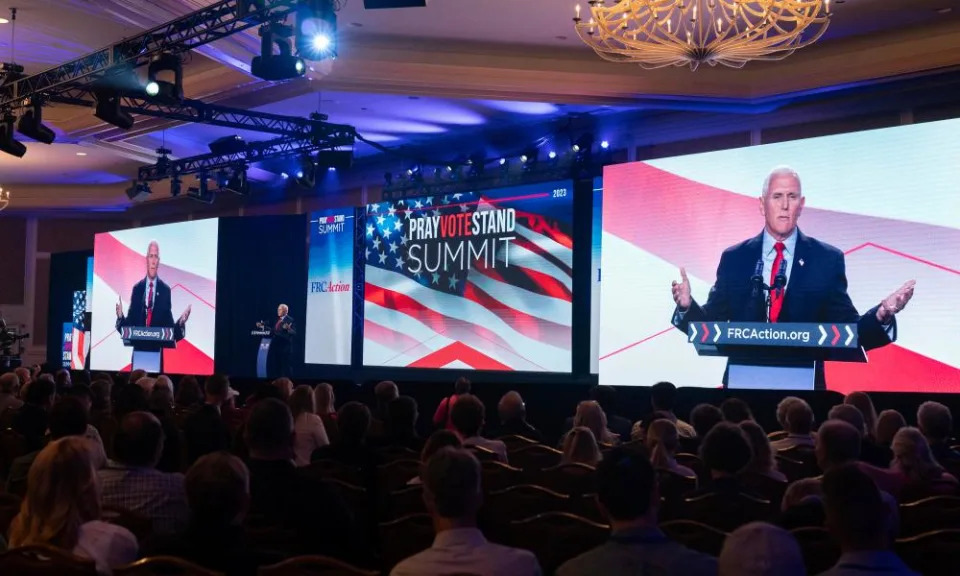David Smith in Washington DC
Sun, September 17, 2023

Photograph: José Luis Magaña/AP
When Donald Trump recalled how his three US supreme court justices helped repeal the nationwide right to abortion, the audience rose to its feet and erupted in whistles, whoops and prolonged applause. But even as the former president basked in the religious right’s moment of triumph, he went on to deliver a warning.
“I will say politically, it’s a very tough, it’s a very tough decision for some people, but very, very hard on elections. Very, very hard,” Trump told a gathering of Christian conservatives in the ballroom of a Washington hotel. “We had midterms and this was an issue, you know.”
He added: “Now we can win elections on this issue but it’s very delicate and explaining it properly is extremely important. Many politicians who are pro-life do not know how to properly discuss this topic, which is so important to the people in this room, so important to millions and millions of people in our country.”
Related: Losing Our Religion review: Trump and the crisis of US Christianity
It was a rare moment of sober reflection during an hour-long speech that otherwise had all the subtlety of a sledgehammer. It also offered a glimpse of the dilemma facing evangelicals as they push the Republican field to embrace their extremist agenda in next year’s presidential election.
Other top Republican candidates for 2024 also trod carefully on abortion at the Family Research Council’s Pray Vote Stand Summit on Friday. The tech entrepreneur Vivek Ramaswamy did not mention the word at all. Ron DeSantis, the governor of Florida, cited his state’s six-week abortion ban in a single sentence. Only Mike Pence, the devout former vice-president, unambiguously committed to a 15-week “national standard”.
The caution signaled Republicans’ awareness of how politically radioactive the issue has become, as evidenced by last year’s midterm elections and other votes in states such as Kansas, Ohio and Wisconsin. A USA Today/Suffolk University poll in June found that 80% of Americans oppose a federal abortion ban, including 65% of Republicans and 83% of independents.
But the religious right looks to be making more headway on other issues. Trump, who got by far the most enthusiastic reception, declared: “On day one I will sign a new executive order to cut federal funding for any school pushing critical race theory, transgender insanity and other inappropriate racial, sexual or political content on our children.”
Earlier, DeSantis, touting his war on “woke”, boasted that Florida has outlawed puberty blockers and gender surgeries, prohibited “gender ideology” in schools and prevented teachers forcing students to identify their pronouns. “We’re not doing the pronoun Olympics in the state of Florida,” he told the conference.
Trailing Trump in opinion polls, DeSantis brought some attendees to their feet by barking: “Do not tell me that a man can become a woman. Do not tell me that a man can get pregnant and expect me to accept that.”
DeSantis’s book The Courage to Be Free was on sale at the conference venue, the Omni Shoreham Hotel, along with titles such as Busting the Barricades by Laura Ingraham, Tucker (about the rightwing host Tucker Carlson) by Chadwick Moore, Blackout by Candace Owens, Woke Inc by Vivek Ramaswamy, The Art of the Deal by Donald Trump and The Greatest Speeches of Donald J Trump.
Attendees wandered through an exhibition hall offering “biblically responsible retirement plans”, “science and statistics for the pro-life movement” and Christian-friendly children’s books. A whiteboard asked people to write their favorite scripture while a lifesize cardboard cutout of Ronald Reagan had a speech bubble playing on one of 40th president’s most famous lines with : “Mr Gorbachev, tear down this hall!”
The backdrop helped imbue religious conservatives with confidence that the presidential contenders will keep their values front and centre.
Anita Stine, 84, a Trump supporter from Irvine, California, said: “I believe that the Republican candidates are going to pursue them strongly because they’re biblical. Not take a life through abortion, not try to claim that you’re a man when you’re a woman – the principles in the Bible are just put right there for us to read and to follow and God’s word is truth.”
But many interviewed by the Guardian tempered such optimism with the hard-headed realism and patience that was rewarded with the fall of Roe v Wade after nearly 50 years of striving.
Michael Case, 68, from Beltsville, Maryland, said: “I want the candidate that’s going to win. I’m very focused on winning this year. So if I had to pick right this second, I would pick Trump.”
Case, who is retired from working at the Nuclear Regulatory Commission, personally favors a federal abortion ban at six weeks or even less but acknowledged: “I’m still against abortion but you’ve got to recognize that there are a lot of people who have a different view and so we need to turn their hearts and minds and that takes a little time. It’s OK to be a little bit pragmatic and win.”
Younger voters agree on the need for step-by-step expediency. Lily Tu, 19, a student from Stockton, California, praised Nikki Haley, the former governor of South Carolina, who during the first Republican primary debate pointed out that a national abortion ban would not pass the Senate and urged Americans to “stop demonising” the issue.
“I like Nikki Haley’s approach because she seems really down to earth in the way that she was having realistic expectations,” she said. “If they’re promising immediate change, that’s not really going to happen. But I trust in those who will take the smaller steps that will maybe lead towards that ultimate goal.”
Jimmy Hammond, 74, a pastor from Lumberton, North Carolina, and a Vietnam war veteran, is adamantly opposed to abortion. “It’s not a political issue with me; it’s a biblical issue,” he said. “Abortion is not right: it’s killing the child and a woman don’t have that right with her body because God gave her her body.”
Hammond is sceptical that any of the candidates will take such a hard line on this or other religious right priorities. He said: “I’m not at all confident any of them would do what is right about it. They’re going to do what’s politically motivating them most of the time.”
Trump, who bills himself as the “most pro-life president” in American history, has been deliberately vague on where the movement goes post-Roe. In June he said: “What I’ll do is negotiate so people are happy.” His reluctance to endorse a federal ban has exposed him to attacks from Susan B Anthony Pro-Life America, a major anti-abortion group, and others on the right.
Pence told reporters on Friday: “He promised to govern as a conservative in 2016 but what I want voters to know is he makes no such promise today. In fact, President Trump has actually blamed election losses in 2022 on overturning Roe versus Wade. He’s joined other voices in this campaign trying to marginalize the right to life as a state-only issue.”
Trump’s circumspection may have cost him the vote of Ken Oliver, 59, from Williamsburg, Virginia, who said he prefers the clarity of DeSantis on abortion and gender identity. “Former president Trump, despite all the merits and many good things he did, is relatively weak in comparison to other candidates, and especially governor DeSantis, on these issues, which are core issues for social conservatives.”
Oliver believes that a federal abortion ban can be achieved incrementally. “We’re not looking back. We’re looking forward. We need to build a consensus around limitations to abortion, whether it’s six weeks or 15 weeks or 20 weeks. Why shy away from that?”
Trump remains well ahead of every major Republican demographic in the race for the party nomination. He has a roughly 35 percentage-point lead over DeSantis and Ramaswamy among evangelical Christians, according to a Reuters/Ipsos poll this week, despite him having been found liable for sexually abusing a New York woman in 1996 and indicted over hush-money payments to an adult film star.
Since early in Trump’s presidency, some evangelicals have likened him to Cyrus the Great, the Persian king who, according to the Bible, enabled Jews to return to Israel from their exile in Babylon. From this perspective, Trump’s own behavior and beliefs are less important than his identity as a vessel of God’s will. Voters say they are choosing a president, not a pastor.
Elaine Beck, 75, a Christian media personality from Tucson, Arizona, said she knows Trump personally and is confident he will pursue the religious right’s goals in a second term: “It has to be God’s way or no way and I believe that God is working in President Trump’s life to help him see that, just like he does you or me or anybody else.”
However, even as they push a hardline agenda, evangelical voters may find their leverage over Republican candidates waning. Ryan Burge, a political scientist at Eastern Illinois University, wrote on the Politico website that the religious right’s grip on the party is weakening with every election cycle.
Trump can therefore afford some erosion of support among evangelicals, Burge argued: “That’s because Trump’s real base of support in the 2016 primary contest came from a rising group in the GOP whose impact has been largely unnoticed: Republicans who hardly ever darken the door of a church, synagogue or mosque.”
Pence, however, denies that the ground is shifting beneath his feet. He told the Guardian: “No, I really believe that the majority of Republicans cherish faith, cherish freedom, cherish those conservative values.”
“As I travel around Iowa and travel around New Hampshire, the warm reception that we receive from almost everybody affirms to me – as someone who’s been in the conservative movement as an evangelical Christian – that the support for our traditional values is alive and well in the GOP today.”



No comments:
Post a Comment